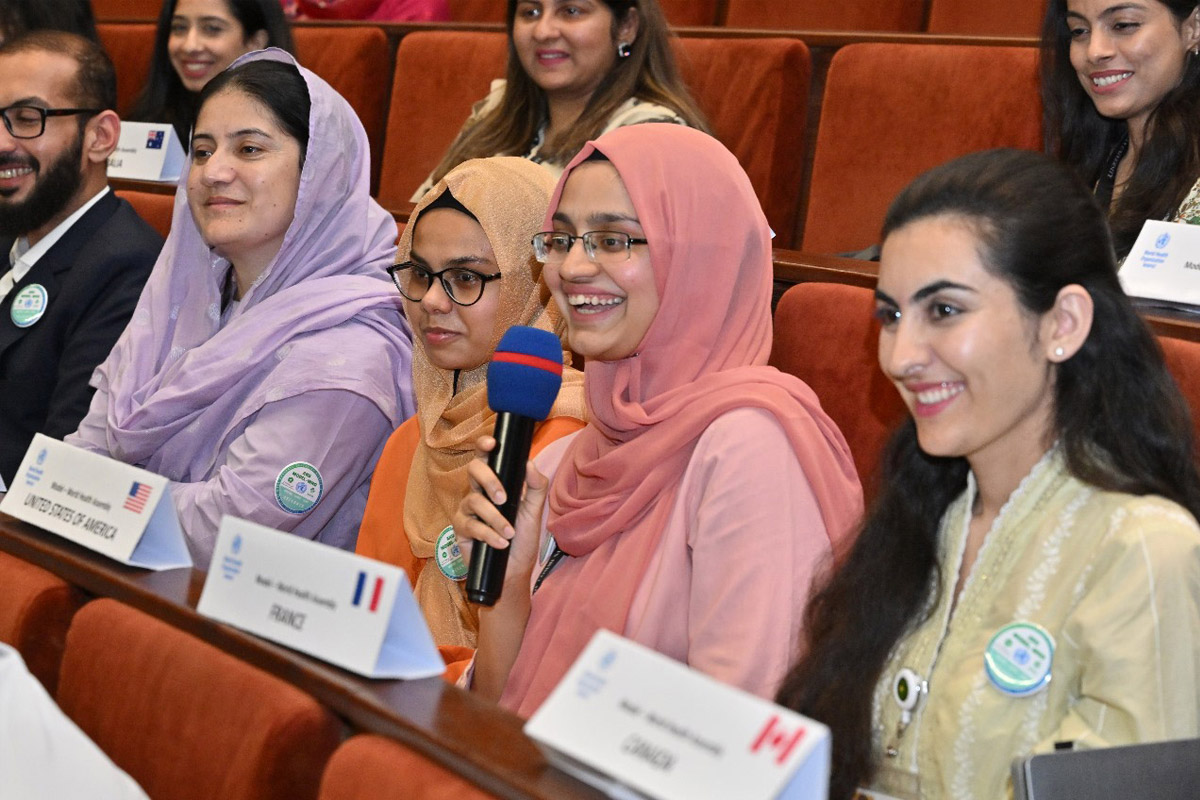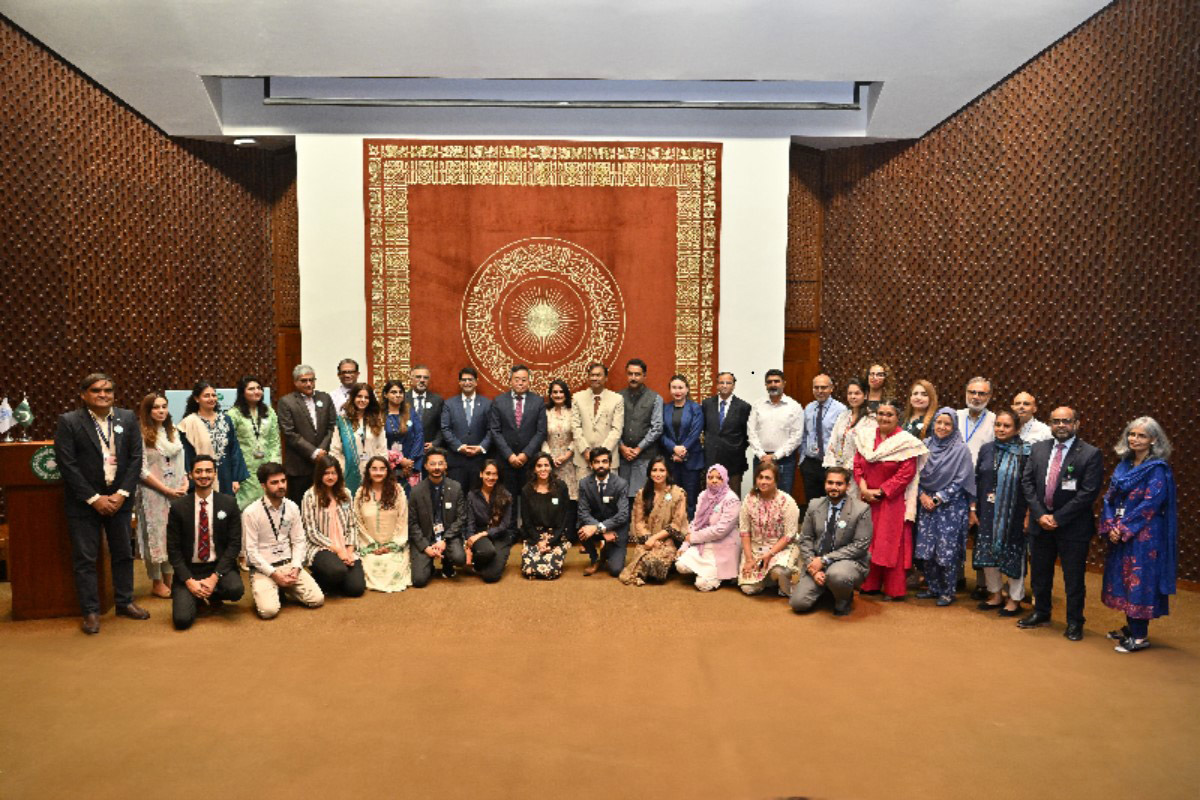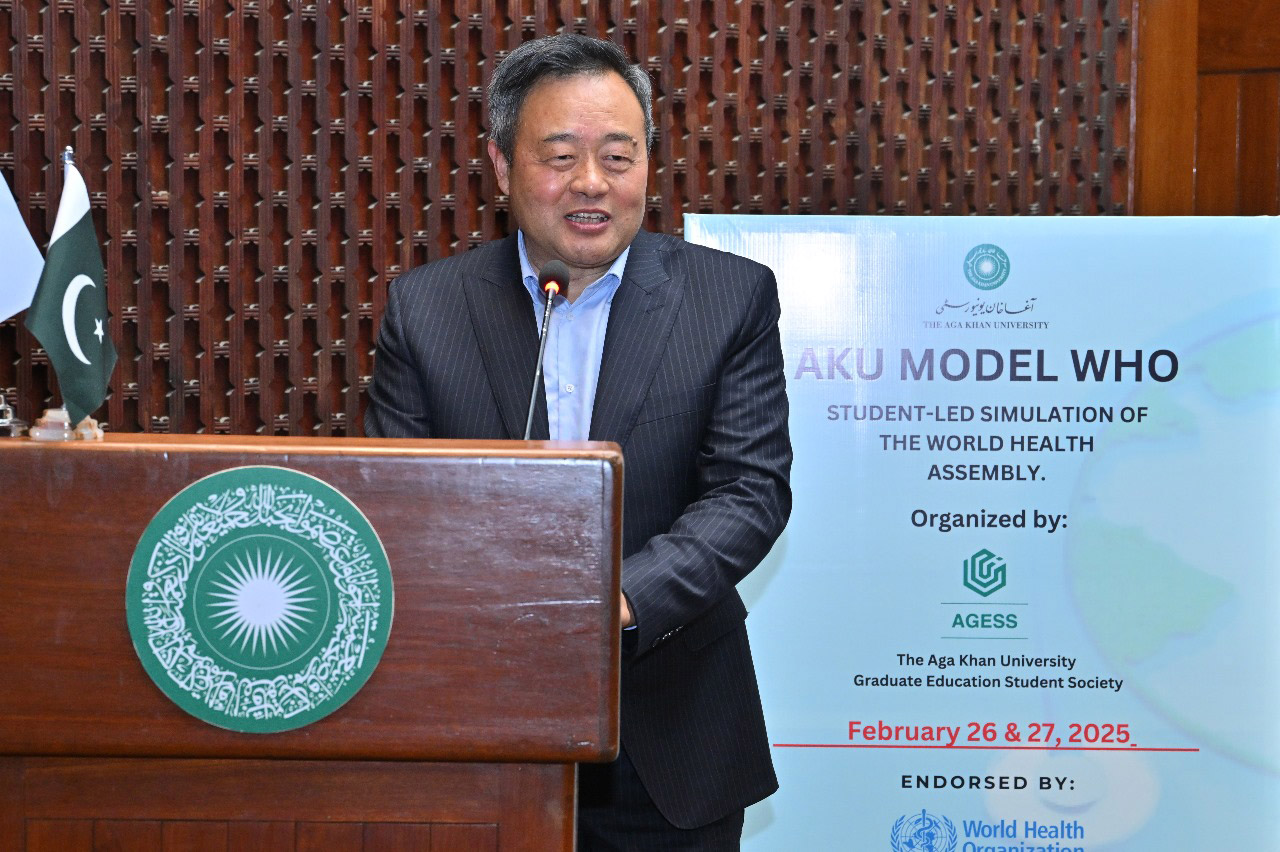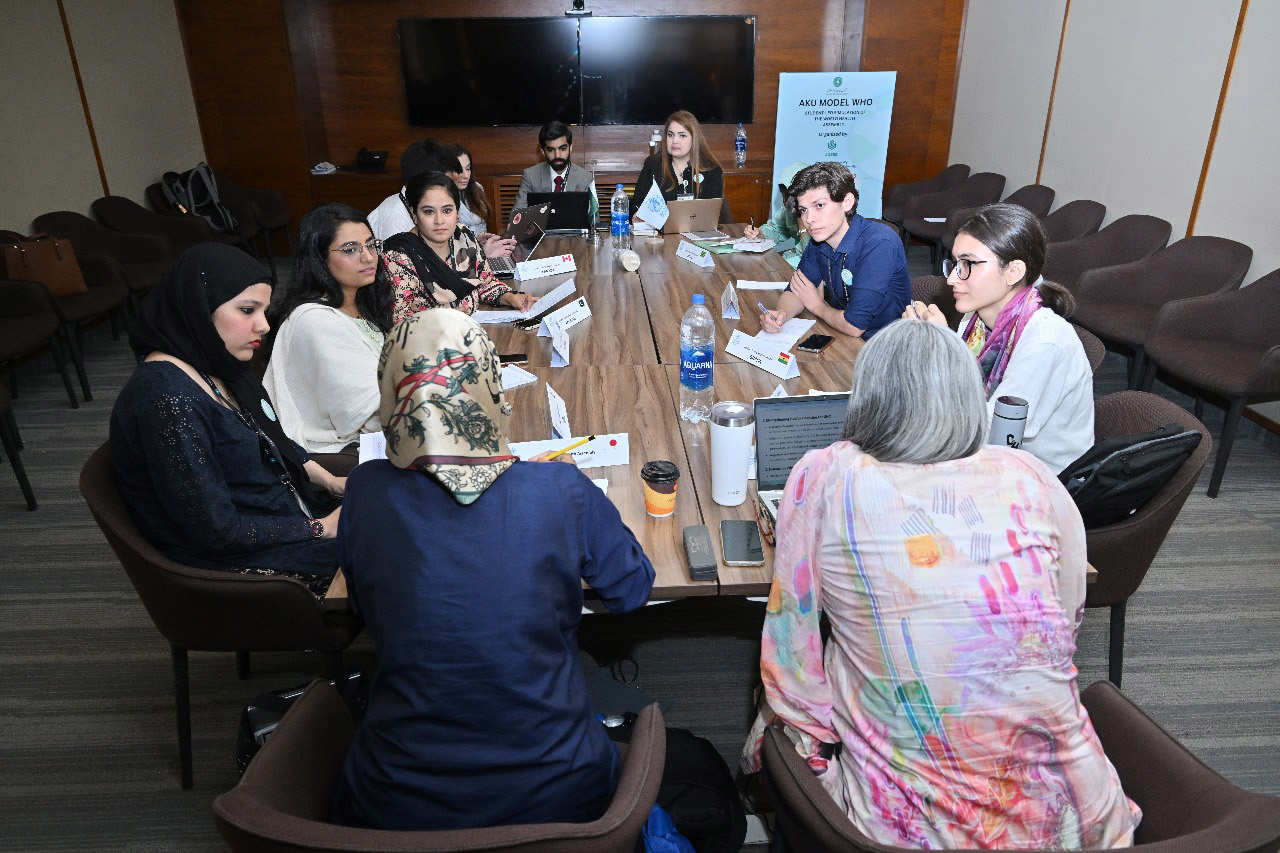 Students during a session of the Model-WHO at Aga Khan University in Karachi, Pakistan. Photo credit: WHO Pakistan21 April 2025, Karachi/Islamabad, Pakistan – “Engaging in debates on global health challenges and hearing diverse perspectives was eye-opening. I am truly grateful for an incredible experience at Model-WHO,” said Munir, one of the participants in the student-led simulation of the World Health Assembly (WHA) organized by Aga Khan University (AKU) in Karachi. The goal of the Model-WHO was to recreate a 2-day session and discuss priority topics to advance health for all – including universal health coverage, pandemic resilience and containment, climate and health response and gender health equity and rights.
Students during a session of the Model-WHO at Aga Khan University in Karachi, Pakistan. Photo credit: WHO Pakistan21 April 2025, Karachi/Islamabad, Pakistan – “Engaging in debates on global health challenges and hearing diverse perspectives was eye-opening. I am truly grateful for an incredible experience at Model-WHO,” said Munir, one of the participants in the student-led simulation of the World Health Assembly (WHA) organized by Aga Khan University (AKU) in Karachi. The goal of the Model-WHO was to recreate a 2-day session and discuss priority topics to advance health for all – including universal health coverage, pandemic resilience and containment, climate and health response and gender health equity and rights.
 Participants in the Model-WHO at Aga Khan University in Karachi. Photo credit: WHO Pakistan "By thinking through issues, exchanging ideas, understanding the positions of other nations, crafting resolutions and drafting position papers our students get a glimpse into the practical world in which governments function,” said Professor Adil Haider, Dean of AKU Medical College. “Learning the softer skills of debating, negotiating, conflict resolution, diplomacy, teamwork and policy creation is critical for leaders, and excelling in them will give our students the confidence to effect meaningful change."
Participants in the Model-WHO at Aga Khan University in Karachi. Photo credit: WHO Pakistan "By thinking through issues, exchanging ideas, understanding the positions of other nations, crafting resolutions and drafting position papers our students get a glimpse into the practical world in which governments function,” said Professor Adil Haider, Dean of AKU Medical College. “Learning the softer skills of debating, negotiating, conflict resolution, diplomacy, teamwork and policy creation is critical for leaders, and excelling in them will give our students the confidence to effect meaningful change."
By recreating sessions of the decision-making body of the World Health Organization (WHO) and engaging students to play the role of different member states and stakeholders the event aimed to foster innovative thinking among the young participants to address global health issues.
“What an incredibly informative and fun 2 days it has been. Looking forward to AKU – MWHO 2.0 soon,” said Maryam, who played the role of delegate for the Climate and Health Response Committee.
During the 2-day discussions, Maryam had debates with multiple colleagues such as Faissal, delegate of the Gender Health and Equity Committee. “The committee leads fostered meaningful dialogue, collaboration and impactful discussions, making this experience both enriching and memorable. I sincerely appreciate the creation of such an engaging and dynamic space providing opportunities to learn and express our ideas on global health issues,” said Faissal.
 WHO Representative in Pakistan Dr Dapeng Luo during the opening remarks of the event. Photo credit: WHO Pakistan“Model WHO at AKU was an extraordinary learning experience where students from diverse backgrounds and disciplines worked together to solve global health challenges. The event exemplified true dedication and collaboration, revealing the leadership potential within each participant. It also highlighted the importance of such events for developing creative thinking and enhancing the interpersonal skills of our next generation of health care educators, researchers and policy-makers," said Professor Shahid Shamim, Associate Dean for Graduate Studies.
WHO Representative in Pakistan Dr Dapeng Luo during the opening remarks of the event. Photo credit: WHO Pakistan“Model WHO at AKU was an extraordinary learning experience where students from diverse backgrounds and disciplines worked together to solve global health challenges. The event exemplified true dedication and collaboration, revealing the leadership potential within each participant. It also highlighted the importance of such events for developing creative thinking and enhancing the interpersonal skills of our next generation of health care educators, researchers and policy-makers," said Professor Shahid Shamim, Associate Dean for Graduate Studies.
The sessions included the participation of WHO Representative in Pakistan Dr Dapeng Luo. “I was inspired by these dynamic and motivated students from Aga Khan University. I am convinced that many of them will make significant contributions to the noble task of improving health for all in Pakistan and globally throughout their careers, perhaps even participating in the World Health Assembly in Geneva one day.”
WHO’s decision-making body works to protect everyone’s health
 During the Model-WHO students led discussions in various thematic committees. Photo credit: WHO PakistanThe World Health Assembly is the decision-making body of WHO. It is attended by delegations from all 194 WHO Member States (including 21 in the Eastern Mediterranean Region) and focuses on a specific health agenda prepared by the Executive Board.
During the Model-WHO students led discussions in various thematic committees. Photo credit: WHO PakistanThe World Health Assembly is the decision-making body of WHO. It is attended by delegations from all 194 WHO Member States (including 21 in the Eastern Mediterranean Region) and focuses on a specific health agenda prepared by the Executive Board.
Since 1948, WHO has been the United Nations specialized health agency connecting nations, partners and communities to promote the highest attainable standard of health for all people, regardless of race, religion, gender, political belief, economic or social condition.
Pakistan joined WHO in 1948, and WHO established its country office in Pakistan in 1960. Since then, WHO and Pakistan have partnered to promote health, keep the world safe and serve the most vulnerable.
The main functions of the World Health Assembly are to determine the policies of the Organization, appoint the Director-General, supervise financial policies, and review and approve the proposed programme budget. The Assembly also approves resolutions, international regulations and reports. The Health Assembly is held annually in Geneva, Switzerland, generally in May.
At the Health Assembly country delegates make decisions on health goals and strategies that will guide their public health work and the work of the WHO Secretariat to move the world towards better health and well-being for all.
The Health Assembly also serves as a forum to review the implementation of agreed policies, identify achievements and determine strategies to address gaps. It approves key global frameworks and regulations such as the International Health Regulations (IHR), an international legal instrument binding on 196 countries, including all 194 WHO Member States.
IHR provide an overarching legal framework that defines countries’ rights and obligations in handling public health events and emergencies that have the potential to cross borders.
Ultimately, the Health Assembly’s main goal is to ensure that all stakeholders work together to deliver health for all, leaving no one behind.




